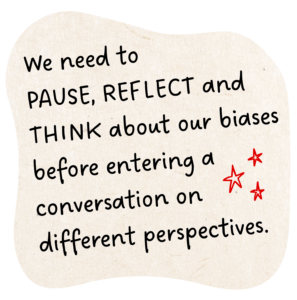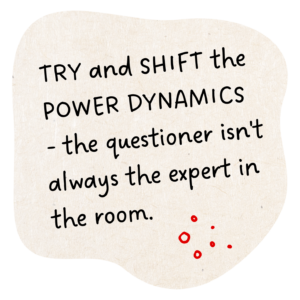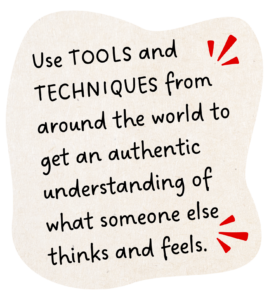Ever been told to imagine yourself in someone else’s shoes?
One of the principles from Dale Carnegie’s best-selling How to Win Friends and Influence People is: “try honestly to see things from the other person’s point of view”. This is called “perspective-taking”.
Many organisations have since adopted various perspective-taking activities – in which colleagues are asked to imagine themselves in another person’s position – to develop empathy, flexibility of thought and interpersonal communication skills between employees.
However, a recent psychological study suggests that although participants believed this practice would be effective, there was no evidence to show that it was. * 
In fact, the authors of this study discovered that getting another person’s perspective directly, through conversation, was the most effective way to increase accuracy, understanding and empathy.
Confronted with this simple and actionable truth, my classmates and I who are all on the same Masters programme together, but are dotted around the world (UK, USA, Canada, China, France, Germany, Zimbabwe, Turkey and Saudi Arabia, to name a few), were asked to reflect on how we might go about ‘getting’ perspectives at work…
Lien: cross-cultural exchange
Lien, who works for a global technology business in China, shares a unique approach where team members are sent abroad for three months to experience and learn from the country’s societal and work-place culture. It’s like a student exchange programme, but for work. During those three months he runs onboarding and cross-cultural workshops with the participant and their peers from the host country. This provides ample opportunities for getting information first-hand. During Lien’s sessions, challenging conversations around different belief systems and ways of being are always acknowledged and worked through, emphasising an ongoing journey towards acceptance and collaboration.
Ozlem: self-reflection
Ozlem, a Turkish literature teacher who has been living in China for the past four years, highlights the importance of self-reflection and self-awareness when it comes to getting different perspectives. In the book, How to Have Impossible Conversations, writers Boghossian and Lindsay make the point: “when you encounter a person with radically different beliefs, you might think they’re ignorant, crazy, or malicious,” often leading to misinterpretations about their intentions and motivations. So, we need pause, reflect and think about our biases before entering a conversation on different perspectives, keeping it grounded in empathy, positivity and open mindedness. For Ozlem, acknowledging one’s biases is a big part of personal and professional development.

Charity: active listening
Charity, who was a specialist cancer nurse and is now a minister at her church in the UK, is passionate about driving justice, dignity, and solidarity in this space and plans to ‘hear’ instead of ‘take’ different perspectives by focusing on active listening. For Charity, listening is well demonstrated when individuals can summarise what they’ve heard. Having a strong understanding of diverse perspectives is vital on a global scale; for example, Charity’s church leaders have recently travelled to Ghana to actively listen and learn about what it means to be a Ghanaian Christian.
Anna: reciprocal focus groups 
Anna, who lives in Luxembourg and has dedicated their career to NGOs, underscores the importance of reciprocal focus groups to shift power dynamics. By organizing mutual sessions in a neutral space, with both leaders and colleagues setting the agenda and having the chance to facilitate, participants can share insights while challenging the assumption that the questioner is the superior expert in the room. This approach aims to bring more balance to the experience of getting perspectives.
No matter what country or industry you work in, perspective-taking can lead you to assume or merely imagine someone else’s position based on what you think you know. Instead, use these tools and techniques from around the world to engage in meaningful conversations and get an authentic understanding of what someone else thinks and feels.
And remember, if you need some support, we’ve always got your back!
Special thank you to Anna, Charity, Ozlem and Lien for allowing me to harness your wisdom!
By Lauren Castle for Alive!
* Tal Eyal, Mary Steffel and Nicholas Epley, ‘Perspective mistaking: Accurately understanding the mind of another requires getting perspective, not taking perspective’, Journal of Personality and Social Psychology.

















